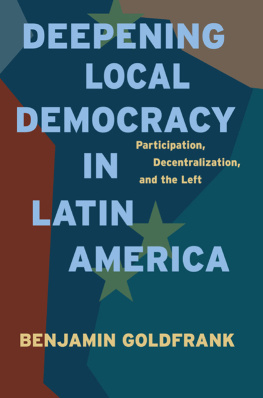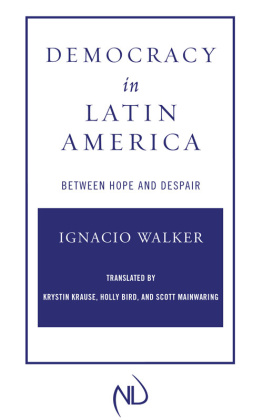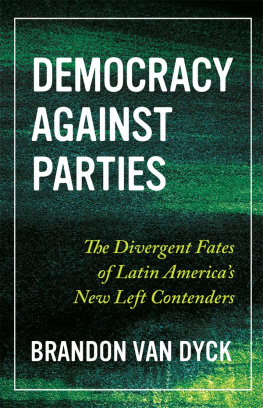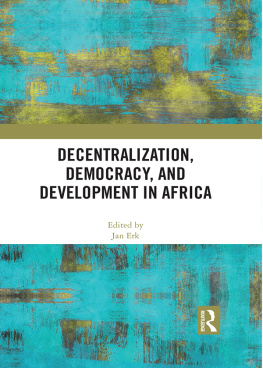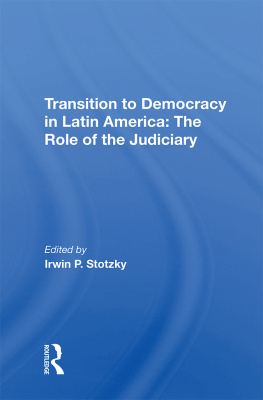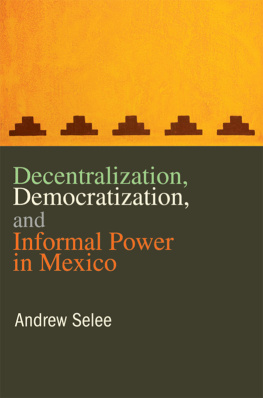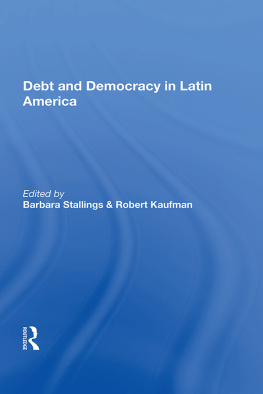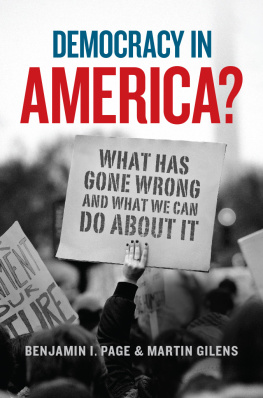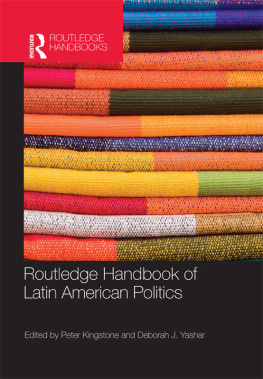Library of Congress
Cataloging-in-Publication Data
Goldfrank, Benjamin.
Deepening local democracy in Latin America : participation, decentralization, and the left / Benjamin Goldfrank.
p. cm.
Includes bibliographical references and index.
Summary: Addresses the question of why institutions meant to attract citizen participation succeed in strengthening civil society and improving state responsiveness and transparency in some places, but fail in others. Focuses on urban politics in Porto Alegre (Brazil), Montevideo (Uruguay), and Caracas (Venezuela)Provided by publisher.
ISBN 978-0-271-03794-3 (cloth : alk. paper)
1. Political participationLatin AmericaCase studies.
2. Municipal governmentLatin AmericaCase studies.
3. Porto Alegre (Rio Grande do Sul, Brazil))Politics and government.
4. Montevideo (Uruguay)Politics and government.
5. Caracas (Venezuela)Politics and government.
6. Comparative governmentCase studies.
I. Title. JS2300.G65 2011
320.8098dc22 2010041995
Copyright 2011
The Pennsylvania State University
All rights reserved
Printed in the United States of America
Published by
The Pennsylvania State University Press,
University Park, PA 168021003
It is the policy of The Pennsylvania State University Press to use acid-free paper. Publications on uncoated stock satisfy the minimum requirements of American National Standard for Information SciencesPermanence of Paper for Printed Library Material, ANSI Z39.481992.
This book is printed on Natures Natural, which contains 50% post-consumer waste.
Over the course of several years of researching and writing this book in several different locations, I have accumulated far too many debts to acknowledge them all individually here. What follows is my best attempt to recognize all those who have helped me in some way or another to make the book possible.
Most of all, I want to thank the dozens of people who allowed me into their homes and offices for often lengthy and always interesting interviews in Caracas, Montevideo, and Porto Alegre. Many of them are named in the course of the book; I have changed the names of those who were not public officials to protect their identities (and of one city employee who preferred anonymity). While all translations of interviews (and of passages from written work) are my own, I owe thanks to Ivette Goldfrank and Nicole Caso for their help translating some particularly tricky dichos.
In each of the three research sites, some individuals went beyond what I expected to provide me with extra help, facilitating access to libraries and data and assisting me in arranging important interviews, and to them I am particularly grateful: Rosangel Alvarez, Carlos Contreras, Ana Maria Sanjun, and Edgardo Lander in Caracas; Rita Grisolia, Alicia Veneziano, Javier Vidal, Maria Elena Laurnaga, Luis Eduardo Gonzlez, and Mara Jos Doyenart in Montevideo; and, in Porto Alegre, Marcello Baquero and Manuel Passos at the Universidade Federal do Rio Grande do Sul, Regina Pozzobon and Srgio Baierle at CIDADE, and Luciano Brunet, Marlene Steffen, and Assis Brasil at City Hall. I also benefited from frequent conversations and pooled resources with fellow researchers to whom I remain grateful: Gianpaolo Baiocchi in Porto Alegre and Daniel Chavez in Montevideo.
In Berkeley, my two chief advisors, Ruth Berins Collier and David Collier, encouraged me to pursue the study of what had originally been a little-known subjectparticipatory budgetingand then consistently pushed me to clarify my concepts and arguments in countless conversations and email exchanges over a number of years. Chris Ansell and Peter Evans likewise provided excellent advice at crucial periods of the research and writing, particularly for the Montevideo case. Michael Watts offered sage advice in the early stages of designing the research project. I also owe thanks to several fellow students at Berkeley for their comments on different aspects of the project: Aaron Schneider, Laura Henry, Loren Landau, Zach Elkins, and Ken Foster. I am also grateful for the generous financial support for the fieldwork and writeup that I received from a number of sources, including the US Fulbright Commission and several institutions at UC Berkeley: the Department of Political Science, the Institute for International Studies, the Graduate Division, and the Center for Latin American Studies.
In Albuquerque, I am grateful to Kenneth Roberts and Andrew Schrank, who provided encouragement and advice, and to Mark Peceny, who read an early draft of the manuscript and offered excellent suggestions. I am also thankful for the Eugene Gallegos Lectureship from the University of New Mexico. In South Orange, I would like to thank Martin Edwards for his advice and support. Several colleagues also provided valuable feedback at conferences where parts of this book were presented, including Brian Wampler, Stephanie McNulty, Yanina Welp, Egon Montecinos, Carlos Mascareo, Alberto Ford, Eliza Willis, and Alfred Montero.
In various places, friends and family both old and new gave me immeasurable apoyo moral. In Caracas, the Flores Lugos brought me into their home and made me part of the family. In wintry Montevideo, Magdalena and Mario offered a warm welcome, as did Rita, Fernando, and Carlitos. And in Porto Alegre, Aaron, Gianpaolo, Jorge, and Jane were constant companions.
My parents, Lois and Wally Goldfrank, provided encouragement, an occasional writing refuge, and eventually, babysitting. Thanks especially to my father for reading and commenting on more than one draft.
Finally, I thank Ivette and Diego for their inspiration and their endless patience.

